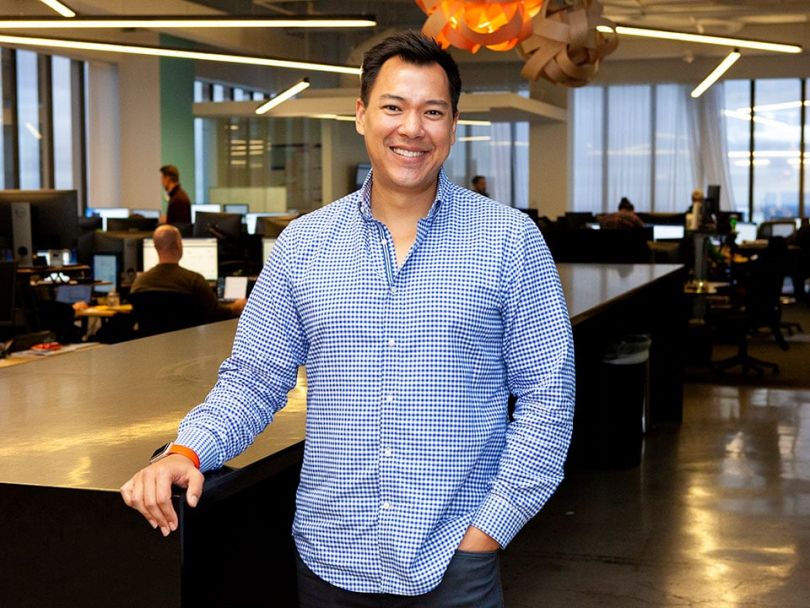Shipwell is on the verge of something big. Like, $35 million big.
After raising that amount in a particularly lucrative Series B, the Austin-based shipping solutions company set its sights on hiring around 200 more employees. When startups scale that much, there’s always a question of how growth will impact the unique company culture.
Whether brainstorming a new solution to a roadblock or joking around over a happy hour, Shipwell’s vibrant culture is an integral part of why employees enjoy coming to work and it’s an aspect that they’re working hard to carefully preserve — even with all of the growth on the horizon.
“It's important to deliberately focus on creating a strong culture very early on and to have ways to measure your cultural attainment over time,” said Jason Traff, president and co-founder of Shipwell. With a distinct identity firmly in place, a career at Shipwell is on track to be as rewarding as it’s ever been. You can take that to the bank.


FOUNDED: 2016
EMPLOYEES: 90, 85 local
WHAT THEY DO: Shipwell is a shipping logistics platform that’s changing up how supply chains operate.
WHERE THEY DO IT: Austin
PERKS ON PERKS: Fully paid health insurance, transportation reimbursement, a competitive parental-leave policy, a volleyball team, and more round out a top-notch list of benefits.


Jason Traff, President & Co-Founder
Traff heads up the marketing, finance and legal departments — all while stewarding the company through serious growth. He was inspired to start Shipwell after running an art business in China that shipped all over the world. “There are so many businesses that need better tools to take back control of their supply chain and turn shipping into a competitive advantage,” Traff said. With that realization, Shipwell was born.
You co-founded Shipwell in 2016. Did you set out to build a particular kind of culture, or did it take shape organically?
From the beginning, we set our culture around six core behaviors, not values, because a group of people that exemplify the same behavior is what forms culture. We see our core behaviors come out every day. For example, one of our core behaviors is “seek learning.” We have formal continuing education policies and reimbursements, but we also do informal ones where, if someone from the company wants to teach a skill they’ve mastered to others, they can host a workshop. In the past, these sessions have included everything from in-office yoga to improv comedy.
Sometimes, a founder, president or CEO can become cornered off from everyone else at the company. How do you stay approachable and in touch with your team?
My desk is the first desk you see after the reception area. So it is literally the most accessible and trafficked desk in the entire office — it takes the open door policy to an extreme level! We have worked hard to create a culture that is a meritocracy of ideas within and across departments. We hold weekly meetings for the entire company, where people are encouraged to ask questions, even anonymously.
From the beginning, we set our culture around six core behaviors, not values, because a group of people that exemplify the same behavior is what forms culture.”
What provisions do you have in place to preserve Shipwell’s culture as you grow?
I’m sure at some point a company’s culture takes on a life of its own. But to me, that just means that it's important to deliberately focus on creating a strong culture very early on and to have ways to measure your cultural attainment over time. Every employee gets taken through Shipwell’s culture deck and spends time with the founders to discuss the company’s vision with the founders. We take a lot of time to talk about our core behaviors and how we measure up to them.


Drew Smith, Data Engineer
Smith manages the data and insights that help the company run smoothly and customers save time and money. He landed at Shipwell after moving to Austin on a whim: “My co-workers have shown me a lot of the city during lunch and drinks after work. They have really made me feel like a local.”
As Jason mentioned, the company has prepared for new growth by instituting a strong culture early on. Do you think the company has changed at all since you started?
I would say our culture has actually not changed much since I started. We have managed to keep a very tight-knit, fun atmosphere on the engineering team while more than doubling the staff. The relationship I have with my peers is the most important aspect of our culture — it’s why I look forward to going to work. We are very much in it together and always have each others’ backs. This is very important because when you like someone, you want to work harder to make their job easier. We all spend time making sure that we are not blocking each other and that everyone has what they need to work well.
Your work is helping to change how supply chains function. What does that look like in terms of the projects you’re building out for the platform?
Shipwell has really allowed me to develop confidence in leading projects. Our data team is very small, so I was given ownership of our entire data pipeline within the first few months of working here. It was definitely stressful at first, but it allowed me to grow very quickly. Another project I work on is our predictive pricing model. I work one-on-one with our lead data scientist to tune and improve the machine learning algorithm we use to predict prices. It is so cool to see people on the sales floor using our models in real time.
The relationship I have with my peers is the most important aspect of our culture — it’s why I look forward to going to work.”
In your line of work, I’m assuming there is a fair amount of conversation that revolves around best next steps. How does your team come up with solutions when problems arise?
I sit directly next to our lead data scientist and we spend all day working together and chatting. Frequently, all we need to get past a mental block is to explain the problem to each other. Once we have finished explaining the problem, the solution is obvious to both of us.
One specific problem that took a bunch of whiteboarding was related to our load batching optimizer. She was struggling to find a set of linear constraints that accurately described the system, so we went into a room and solved linear algebra equations for hours until we found the constraints that worked.


Morgan Kilgore, Backend Engineer
Morgan and her team are currently working on fine-tuning the functionality of the platform’s integration with FedEx. “Now that we are one of FedEx’s certified partners, we are working on exposing that functionality to our customers,” she said.
You’ve been at Shipwell for about a year. How quickly did you find yourself becoming a part of Shipwell’s culture?
On day one, I was encouraged to express any ideas or suggestions I had — and those ideas were valued. We work really closely with senior leadership and are always communicating with them. As an engineer at Shipwell, you have the opportunity to have a say on architecture decisions and have your voice heard. We are always brainstorming and whiteboarding to come to the best decision as a collective group, so there is a lot of collaboration and idea generation amongst each other. It’s a really cool environment to be in, due to the fact that the decisions you and the engineering team make are really seen and felt across the company.
Aside from being made to feel supported enough to share your ideas, what are some other ways Shipwell made you feel at home?
Everyone was really eager to get me up to speed and help with any questions I had. I was also able to really get a good grasp of what Shipwell’s culture was like since I started around the same day as our new brokerage class, so I was able to attend our Freight 101 class. Within those classes, you get a good sense of Shipwell’s culture through the people teaching the class as well and the people that were attending.
On day one, I was encouraged to express any ideas or suggestions I had — and those ideas were valued.”
Speaking of getting a sense of the culture — in a nutshell, what’s the engineering team like?
The engineering team is a fun and smart group of individuals. We all like to have fun but are also very focused on delivering the best product we can. With this focus, it’s very important to have open lines of communication so that we can deliver fast and efficiently. Knowing I can ask any of my fellow engineers questions or quickly have a whiteboarding session to clear up implementation details helps tremendously.




